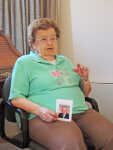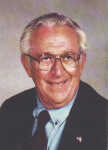From Hell to Here -- Southwest Nebraska helped death camp survivor start new life

McCOOK, Nebraska -- A recently-deceased survivor of Nazi death camps began a new life in America more than 60 years ago, thanks to an American GI from Lebanon, Nebraska.
Benny Hochman was 89 when he passed away May 29 in Sidney, Nebraska, a life marked with atrocities he suffered in Auschwitz and Buchenwald but ending with an untiring love of his adopted country.
It began in Lodz, Poland, where his father owned a thriving bakery with 22 employees. When the Nazis invaded in 1939, they put the bakery in control of the housekeeper's son and all food items had to be given to the Germans.

As the Nazis increased their reign of terror on the Polish people, his mother begged his father to move the family out of the country, Hochman wrote in his book, "From Hell to Here." But his father was adamant in staying, as he had spent his life building up his bakery and did not want to leave it.
The Nazis were threatened by professionals and those who were educated, as they were seen as resisting the new government. Many non-Jews were rounded up as "political prisoners" and deported to the burgeoning system of extermination camps in Poland and Germany.
In the middle of the night, the Gestapo came pounding on the door of his family and demanded his older brother, who had been a soldier in the Polish Army.
Hochman's mother resisted and was knocked to the floor by the Gestapo. When 16-year old Hochman tried to help her up, the Nazis dragged him out along with his brother.
They were herded into boxcars crowded with so many other people that some died of suffocation. After three days without food or water, they arrived in Auschwitz. Shortly after arriving, Hochman's brother, already ill from the transport and too weak to fight for scraps of food, was unable to stand during the morning line-ups, even with help from Hochman and friends. The Nazis shot him as he lay at Hochman's feet.
It was at that moment, Hochman related later in his book and in countless speeches in the U.S., that he made a vow that he would not let the Nazis kill him and that he would do anything to survive.
"They're not going to do that to me," he said. "I am going to kill before I die. And if there's anything that looks like food, I don't care about you or anybody else, I will get it.
"I became a beast, I did what I had to do."
When talking to students after the war, he was unflinchingly honest in describing his experiences and said he was not proud of the things he did to survive the concentration camps. "I became a terrible animal," he said, fighting other prisoners over scraps of food, even stomping on people's hands to get to it. "I'm not very proud of it," he said, "but I am here, alive."
He was assigned to work in the gas chambers in Auschwitz, that have since been preserved as a memorial in Poland and where indentations on the cement walls can still be seen from victims clawing the walls as they suffocated.
After the victims were dead or nearly dead, the bodies were dumped into the basement. It was his job to removed any gold teeth or jewelry left on the bodies for the Nazis, then stuffing the bodies into the crematoriums. If the item could not be removed by pulling on it, he had orders to hack off the finger or body part with a small hack saw he carried.
The velocity of the gassing increased to the point that the crematoriums were unable to keep up, so Hochman then had to drag the bodies to a nearby pit, throwing them on top of a fire.
Eventually, he learned his parents and little sister perished in Auschwitz as well. A fellow inmate at Auschwitz told Hochman that luggage with their names on it had been found in the camp.
Years later, after Hochman had retired, he visited Auschwitz with family members and broke down when he saw a blond pony tail on top one of the piles of hair the Nazis had stockpiled. (The hair was woven into cloth for horse blankets or truck cushions) The pony tail had reminded him of his little sister, he said in his book.
When the Russian Army began to invade Poland, the Nazis forced the prisoners to walk in the cold and snow to another death camp, Buchenwald in Germany.
It was there he and other prisoners were put to work on Adolf Hitler's pride and joy, the autobahn, or high speed express highways across Germany.
Hochman noted in his book that the autobahn is still noted for its innovation yet was built using slave labor.
The starvation and life in the camps were taking its toll and the 22 year old was near death when the camp was liberated by the Signal Battalion 926 of the U.S. Army.
In fact, he was so near death that he remembers nothing of the liberation, only that he was told he was laying in a ditch near the electric fence. He weighed 78 pounds.
An American officer took him to a U.S. Army field hospital, where he slowly recovered. After six weeks, he returned to the 926th Battalion, where he was made a T-5 corporal and worked as an interpreter..
The American troops took him under their wing, he said, and he grew to love to Americans and the country they represented. Hochman very badly wanted to live in the U.S., and the Army tried to help him do so.
It was during that time that he bunked with another soldier of the 926th, Ed Townley, a native of Lebanon, Nebraska. For two years they shared a room and many conversations.
As the U.S. soldiers gradually were sent back to the U.S., many promised to make arrangements for Hochman to join them. But none came through for him, he said in his book, except one - the Nebraska GI, Ed Townley.
Nelda Haag, the brother of the late Townley, said that Hichman had made quite an impression on her brother and that he was going to find a way to get him to America "no matter what."
As the result of the Townley family sponsoring him, Hochman had the documents necessary for him to come to the U.S.
But the military wanted him too, and asked to stay in New York as an interpreter. Hochman had a flair for languages and was fluent in several, the result of the years he spent with other prisoners who had been shipped from across Europe to the camps.
In his book, Hochman said he gave New York a try for a few days, but was lonely and discouraged by the indifferent New Yorkers.
In contrast, when he finally came into the village, Lebanon, Nebraska, on a train, about 300 were there to greet him, complete with the high school band.
"World got around, everyone wanted to see him," Nelda recalled, who was a young wife at the time.
The Townley family welcomed the shy 22-year old as their own, she said. "There were nine of us kids and mom always said, what's one more.
"He became a part of our family, he and his family were there for drawing names for Christmas, everything." Nelda also remembers that as soon as Benny arrived, he was insistent on finding work and not be dependent on anyone.
"He wanted to pay back everyone, didn't want to owe anyone any money," she said.
He was taken to McCook, Nebraska, where he saw the Falllick Bakery. With memories of his father's bakery, He insisted on applying for a job there, although friends encouraged him to take a week or two off to settle in.
He was hired on the spot. Later, he worked for the Burlington Northern Railroad and then found work at the local telephone company in McCook.
He was transferred to Sidney, where he remained for the rest of his life with the telephone company. After his first wife, Bernadine Rogers of McCook, passed away from cancer, he married Marie.
He was active in many community organizations, a tireless advocate of higher education and the local community college and served on the city council and chamber of Commerce.
Although the experiences he suffered during World War II were painful, he was emphatic that he share them at schools and civic organizations, driven by his love of America and the freedoms it upheld.
As he once told Nelda, "I've got to get it out of my system." He didn't talk too much about the camps, she said, although he did talk from time to time about his little sister, Rosie.
"He was a happy man who was so proud of his family," she said. " And he loved America. He would end almost every speech with the words, 'I love America. I am free."
